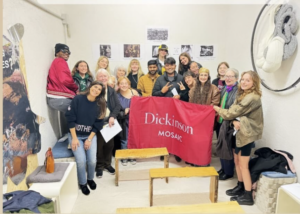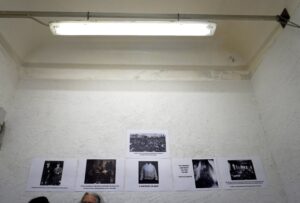Labor Exploitation Behind Made in Italy
by Ady Salvatierra
On Sunday March 16, the Mosaic group attended a Bio Fashion Lab workshop in Florence. This workshop highlighted the harsh reality of wage theft and labor exploitation that many garment workers have faced, and continue to face today. In Debora Florio’s Fashion Lab she sells upcycled clothing, highlights new and upcoming designers, and offers a space for workshops to spread awareness of the harmful impacts of fashion. Her goal in doing this is to create space to shed light on the exploitation within the fashion industry, and ultimately to inspire change as a community.

A group picture of the Mosaic students and faculty with Debora Florio and two textile workers from Prato.
The workshop began with an interactive testimony given by young women who worked in the Triangle Shirtwaist factory in the early 20th century. The testimony explained how many of the women working within the factory were European immigrants and were treated as commodities. Their working conditions were inhumane and their protests were not heard until after the tragedy of the fire that occurred in 1911. Hearing the stories of the women was heartbreaking. We learned that for ninety years the Shirtwaist Factory fire was the deadliest workplace disaster in New York and sparked major change for workers rights within the United States. Prior to the Triangle Shirtwaist Factory fire, many of the Italian workers working in the garment industry were not involved in unions. Following the fire the Italian community took part in labor strikes and change for labor rights within the United States took place.
Many people working within garment factories are still being exploited today. As we learned in the workshop, the people producing garments put so much of themselves into their work and often do not get fair compensation. The two garment workers we met Raza Muhammad and Abbas Zaigham explained to us that conditions are far from ideal. Fighting for basic workers rights such as securing eight hours a day was a big struggle. There is, however, hope in the future by spreading awareness, being conscious and intentional with who consumers are buying products from, and finally, encouraging workers to join unions in order to make permanent change.

The setup with pictures from the Triangle Shirtwaist factory at the Bio Fashion Lab meet up in Florence.